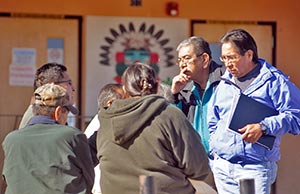Hopi council restructures government
By Cindy Yurth
Tséyi' Bureau
KYKOTSMOVI, Ariz., Nov. 25, 2009

(Special to the Times - Donovan Quintero)
Vice Chairman-elect Herman Honanie, right, listens as a concerned citizen talks about the current state of affairs in the Hopi government in Kykotsmovi, Ariz.
In a special meeting Sunday, just a week before a new chairman and vice chairman were set to take office, the Hopi Tribal Council voted to strip the chairman of many of his executive duties and place them in the hands of a yet-to-be-hired "tribal CAO."
Council Member Davis Pecusa (Bacavi) introduced the resolution, based on a five-year study by a task force on governmental reorganization.
Pecusa said the reorganization, which is similar to a weak-mayor form of municipal government, would enable the council to have its initiatives carried out by a professional manager rather than an elected official who may or may not have managerial skills.
Opposition leaders, however, characterized the move as a last-minute power grab by what they consider an illegal council.
"They've been talking about restructuring the government for five years now," said Clark Tenakhongva, who ran unsuccessfully for tribal chairman. "Why do it now, on a day most people want to spend time with their families, before the chairman and vice chairman are even sworn in? What's the rush, unless they just want to hold onto their power?"
The vote was disrupted by a protestor, Shannon Francis, who ran into the center of the council chambers and introduced herself as a great-great-great-granddaughter of the revered Hopi chief Loloma.
"What you are doing does not represent my ancestors, it does not represent my descendants, and it does not represent me!" Francis shouted.
She was escorted out of the building. Her actions drew applause from some of the 30 people attending the meeting.
The vote in favor of change was 12-3, with Chairman-elect Leroy Ned Shingoitewa and Vice Chairman-elect Herman Honanie two of the dissenting votes.
Shingoitewa and Honanie both campaigned on a reform platform, with Shingoitewa pledging to review the council's resolutions of the past year and recommend the better ones be brought before the newly constituted council for passage and the rest allowed to die.
Shingoitewa and others have argued none of the council's resolutions passed since last December, when Chairman Ben Nuvamsa and Vice Chairman Todd Honyaoma stepped down, are valid, because the Hopi Constitution provides that the council must have a chairman and vice chairman.
The council postponed and then eliminated a planned special election to replace the chairman and vice chairman, instead naming Council Member Phillip Quochytewa "presiding officer" and continuing business as usual.
Shingoitewa and Honanie, council members from Upper Moencopi and Kykotsmovi, respectively, were elected last week during the regular election.
The two might have had more support on the council had the council election in Kykotsmovi not been nullified last week. Two reformist candidates were elected, but the incumbents protested, disputing the residency of one of the successful candidates. The village will hold a second election after the residency dispute is cleared up.
Meeting in regular session Monday to go over the budget, the council reportedly voted to merge the offices of chairman and vice chairman, and to defund the tribe's 50-year-old official newspaper, the Tutuveni.
Tutuveni Editor Stewart Nicholas, however, noted the budget has not yet been passed and there is "a small ray of hope" the council will change its mind.
Also on Sunday, the council met as the shareholders of the Hopi Tribe Economic Development Corp. They voted to dissolve that entity's board of directors and replace it with the Hopi Tribal Council (aka, themselves).
Council Member Dale Sinquah (First Mesa) argued that the corporation's endeavors had been largely unprofitable and sweeping changes were needed.
One of the ousted board members, Joan Timeche, countered that the corporation is federally chartered and said shareholders cannot change the bylaws without going through the federal government.
But tribal attorney Scott Canty said he had written the articles of incorporation specifically so the board composition could be changed without federal approval.
After the meeting, Shingoitewa said he is confident he and Honanie can reverse the trend of an ever-more-powerful council when they take office Dec. 1, in spite of the council's decision to deprive them of much of their authority and budget.
"I'm not going to tell you how, but we can do it," he said. "The villages are going to have to get behind us."

